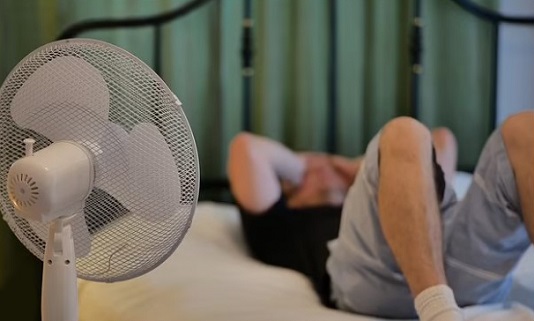Nikhil Prasad Fact checked by:Thailand Medical News Team May 24, 2024 1 year, 7 months, 1 week, 9 hours, 56 minutes ago
Health News: Climate change is intensifying extreme weather events, including the frequency of hot, tropical nights. These nocturnal heat waves are becoming a significant health concern, particularly in terms of their impact on stroke risk. A recent study conducted by researchers from Helmholtz Munich and the Augsburg University Hospital has shed light on this pressing issue. The study covered in this
Health News report, was led by Dr Alexandra Schneider and explored how elevated nighttime temperatures can increase the likelihood of strokes, emphasizing the need for public health interventions and urban planning strategies to mitigate these risks.
 Hot Nights Increases Risk For Stroke
Hot Nights Increases Risk For Stroke
"Tropical nights," defined as nights when temperatures exceed a certain threshold, are measured using the Hot Night Excess Index (HNE). This index quantifies the degree to which temperatures rise above a specific value, which in this study was set at 14.6 °C. When nighttime temperatures surpass this threshold, the risk of stroke increases, particularly among vulnerable populations such as the elderly and women.
Unveiling the Data: A 15-Year Study
The research team analyzed data from the Department of Neurology at Augsburg University Hospital, encompassing around 11,000 stroke cases over 15 years. Their findings revealed a startling correlation: extreme nocturnal heat raises the risk of stroke by seven percent. The data showed that the risk of stroke related to high nighttime temperatures increased significantly between 2013 and 2020 compared to the period from 2006 to 2012.
During the earlier period, hot nights resulted in two additional strokes per year in the study area. However, this number skyrocketed to 33 additional cases annually from 2013 to 2020. These statistics underscore the escalating impact of climate change on public health, particularly in regions experiencing more frequent and intense nocturnal heat waves.
Implications for Public Health and Urban Planning
The study's authors, including Dr Cheng He and Professor Michael Ertl, emphasize the need for proactive measures to address the health risks posed by rising nighttime temperatures. Adjustments in urban planning and healthcare systems are crucial to reducing these risks. For instance, cities can implement strategies to diminish urban heat islands, such as increasing green spaces and improving ventilation in densely populated areas.
Moreover, healthcare facilities need to be better prepared for an influx of stroke patients during hot nights. Hospitals can allocate more resources and staff during periods of predicted extreme heat to ensure adequate patient care. This proactive approach can help mitigate the adverse effects of nocturnal heat on vulnerable populations.
The study also highlights the importance of developing public adaptation strategies. Educating the public about the risks associated with tropical nights and promoting preventive measures, such as staying hydrated and maintaining cool indoor environments, can help reduce the incid
ence of heat-related strokes. Early implementation of these measures is crucial to protecting public health in the face of climate change.
Understanding the Impact of Nighttime Heat
The physiological mechanisms underlying the increased risk of stroke during hot nights are complex. Nighttime heat exposure can disrupt normal sleep patterns and circadian rhythms, leading to increased stress on the cardiovascular system.
This disruption can exacerbate pre-existing health conditions and elevate the risk of stroke, particularly among individuals with underlying vulnerabilities such as hypertension, diabetes, and cardiovascular diseases.
Older adults are particularly susceptible to the effects of nighttime heat due to age-related physiological changes that reduce their ability to regulate body temperature. Women also face a higher risk, which may be influenced by hormonal differences and higher body fat percentages compared to men. These factors contribute to a decreased capacity to dissipate heat effectively, increasing the likelihood of stroke during hot nights.
The study's comprehensive analysis of stroke subtypes revealed that nocturnal heat significantly increases the risk of ischemic strokes, which are caused by blood clots obstructing blood flow to the brain. Dehydration and elevated blood viscosity during hot nights can promote clot formation, heightening the risk of ischemic strokes. While the impact on hemorrhagic strokes, caused by bleeding in the brain, was less pronounced, high temperatures can still elevate blood pressure, a known risk factor for this stroke subtype.
Moving Forward: Adapting to a Warmer World
The findings of this study underscore the urgent need for adaptive measures to address the health impacts of climate change. As nighttime temperatures continue to rise, it is essential to implement strategies that protect vulnerable populations and reduce the risk of heat-related health issues.
Urban planning plays a pivotal role in mitigating the effects of nocturnal heat. Incorporating more green spaces, improving building designs to enhance natural ventilation, and reducing the density of urban heat islands can help lower nighttime temperatures in cities. Additionally, public health campaigns should focus on raising awareness about the dangers of hot nights and promoting behaviors that minimize heat exposure.
Healthcare systems must also adapt to the increasing frequency of hot nights by preparing for potential surges in stroke cases. By allocating additional resources and staff during predicted heat waves, hospitals can ensure that patients receive timely and effective care. These measures, combined with broader public health initiatives, can help mitigate the adverse effects of nocturnal heat on vulnerable populations.
In conclusion, the study by Helmholtz Munich and the Augsburg University Hospital highlights the significant health risks posed by rising nighttime temperatures. As climate change continues to drive these extreme weather events, it is imperative to implement adaptive strategies that protect public health. By addressing the challenges posed by tropical nights through urban planning, public health education, and healthcare preparedness, we can better safeguard our communities against the growing threat of climate change.
The study findings were published in the peer reviewed European Heart Journal.
https://academic.oup.com/eurheartj/advance-article/doi/10.1093/eurheartj/ehae277/7676519
For the latest
Health News, keep on logging to Thailand Medical News.
Read Also:
https://www.thailandmedical.news/news/treating-afib-with-ablation-reduces-mortality-and-stroke
https://www.thailandmedical.news/news/eu-and-us-fda-approved-cerebrotech-visor-device-could-be-a-defibrillator-for-stroke
https://www.thailandmedical.news/news/yoga-and-tai-chi-may-has-preventive-and-curative-effects-on-people-who-are-at-risk-of-strokes-or-even-stroke-victims.
https://www.thailandmedical.news/news/novel-approach-to-stroke-treatment-could-reduce-brain-damage
